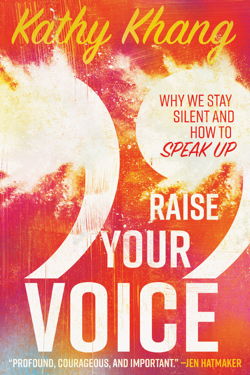 This July, we are so pleased to share a series of book excerpts at The Well courtesy of InterVarsity Press. I'd like to introduce you now to Kathy Khang's latest book entitled Raise Your Voice: Why We Stay Silent and How to Speak Up.
This July, we are so pleased to share a series of book excerpts at The Well courtesy of InterVarsity Press. I'd like to introduce you now to Kathy Khang's latest book entitled Raise Your Voice: Why We Stay Silent and How to Speak Up.
When my daughter was four years old, anytime she had something to say — whether it be the mundane of what she had for snack that day at school or the milestone announcement of a loose tooth — she would stop us in our tracks and make a declaration that she was going to speak with the phrase, “I need to tell you something.”
In a world with two older brothers, she fought (and still fights) to carve out a space for her voice to be heard, sometimes with literal screams and temper tantrums and occasionally with a well-articulated statement. And while society could hand me hundreds of books on how to raise my daughter (and even more books specifically on how to raise my sons), rarely have I found a book on how to give birth to and raise my voice.
In her new book, Raise Your Voice: Why We Stay Silent and How to Speak Up, Kathy Khang encourages us to consider how we can raise and develop our voices, from birth to fullness of maturity. We are invited to experience the discomfort and pain (as well as the victories) of Khang’s story of learning to speak and fighting to be heard as a Korean American immigrant woman in the context of North American suburban evangelicalism.
In addition to inviting us into her own story of giving birth to her voice, Khang takes us through the journeys of Moses and Esther and the way in which knowing and owning their stories shaped the raising of their voices to bring freedom and justice to their communities. Through these stories, Khang invokes us to know our own stories and to consider our own callings to speak — with our bodies and our voices, as individuals and as part of a larger community — to bring the good news of the Gospel.
— Caroline Triscik
You can read about the good news of speaking out in the first excerpt of this series. You might also enjoy listening to our interview with Kathy Khang.

"Struggling with Credibility" — An excerpt from Raise Your Voice
I’m a Korean American married mother of three with no advanced degree living in the suburbs in the middle of a midlife crisis, wondering how or if my twenty years of vocational ministry can transfer into a different vocation. I write infrequently. I speak even more infrequently. I have been told that I’m a prophetic voice, but I cringe at that description because biblical prophets are lonely and cranky, and I want to be perceived as fun and warm. Oh, and did I mention that I’m a woman of color in ministry?
Almost ten years ago, I supervised a ministry staff team that worked with four distinct student populations with a reach of about three hundred active students. I learned that a group of local Asian American pastors were meeting periodically to talk about ministry and leadership and pray for one another — but I never received an invitation to those meetings.
A few years later, I hired a graduating student leader, a young Korean American man, to join my staff. He fairly quickly received an invitation to attend the pastors’ gathering. Holding back tears, I told him that I had never been invited to attend those meetings. Still, with a mix of frustration based on my experience and hope for what he might experience, I told him that I wanted him to go, learn, and speak into that group.
It took him a moment to realize what the significance of the invitation was for him and what the lack of an invitation meant for me. Ten years of ministry wasn’t enough credibility to overcome the fact that I am a woman.
Moses struggled with credibility as well. It’s almost comical to read God’s assurances in Exodus 4 when you realize that Moses is just as insecure as the rest of us. God goes to great lengths to build up Moses: he gives superpowers to Moses’ staff, he shows Moses a cool cloak trick involving leprosy, and teaches Moses how to turn water from the Nile into blood. Yet Moses says, “Pardon your servant, Lord. I have never been eloquent, neither in the past nor since you have spoken to your servant. I am slow of speech and tongue” (Exodus 4:10). And if that wasn’t enough, Moses then says, “Pardon your servant, Lord. Please send someone else” (Exodus 4:13). This is when I want to laugh at Moses. Who does he think he is?
Oh, wait. Kathy, meet Moses.
Before taking the ministry staff job, I was struggling with what I still struggle with — managing work and family. I was a mom to one preschooler and two grade school children. My internal script screamed, Who do you think you are trying to lead and grow ministry and develop a staff team while raising three children and being a good wife? I have kids who get sick and want me at their Valentine’s Day parties. Please send someone else.
I suppose if I had kept that thought to myself, it might have been a little different, but instead of talking to God or a burning bush or my backyard fire pit, I shared this internal script with my staff team. I tried to paint a picture of how and where I thought ministry could grow on campus while also externally processing my personal insecurities. I would remind the team, “I am just part-time, so I can’t fulfill all of my job responsibilities; also, I have to leave to pick up my sick kid, so I’ve asked my predecessor to lead the rest of the meeting.” Yes, I actually said those things out loud, which doesn’t set up expectations well for anyone. My years managing the team weren’t my best as a leader, but I learned a lot about imposter syndrome. It can kick your ego and paralyze you.
God knows that Moses has impostor syndrome but essentially gives him no room to back out. God enlists the help of Moses’ brother Aaron as a wingman, reminds Moses that his shepherd’s staff has superpowers, and pushes Moses out of the wilderness. The rest of Exodus reminds us that just like Moses, whether or not we carry a shepherd’s staff, we don’t know the power of using our voices until we try it.
— Taken from Raise Your Voice by Kathy Khang. Copyright (c) 2018 by Kathy Khang. Published by InterVarsity Press, Downers Grove, IL.
If you enjoyed this excerpt, consider purchasing Kathy's book using the 40% off discount code (including free U.S. shipping) that InterVarsity Press is offering readers of The Well: WELL4513. (Good through August 31, 2018 on the title Raise Your Voice.)